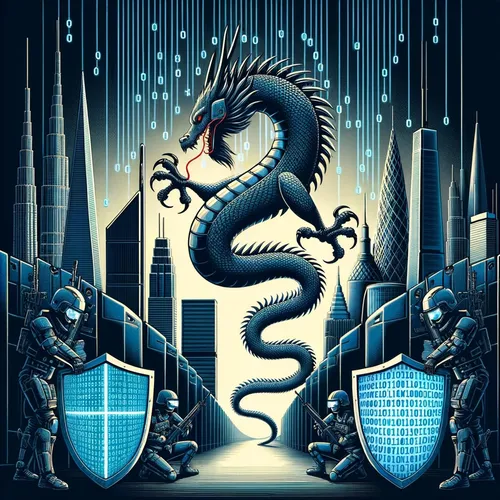China's Hacking Ninjas Strike Again: Phishing, Panda Tricks, and Password Panic!
- Author
- Quiet. Please
- Published
- Sun 07 Sep 2025
- Episode Link
- https://www.spreaker.com/episode/china-s-hacking-ninjas-strike-again-phishing-panda-tricks-and-password-panic--67665546
This is your Dragon's Code: America Under Cyber Siege podcast.
Here’s Ting with your Dragon’s Code download, fresh from the front lines of the America-China cyber showdown. If you thought last week was a spicy dumpling, buckle up—because Chinese state-backed hackers have been busier than a CISO at password change day. First up: meet APT41, the digital ninjas working in the shadows for Chinese intelligence. They pulled off a classic phishing move—posing as Representative John Moolenaar just as the US and China were prepping for high-stakes trade talks. The hackers sent a convincing malware-laced email to US government agencies and trade groups, with the subject: “Your insights are essential.” Spoiler: opening that doc would have let the intruders rummage through government files like a raccoon in a trash bin. The Wall Street Journal revealed that security staff got suspicious when questions started flooding in about an email the Congressman never sent.
The FBI and US Capitol Police are on the hunt, but the sophistication was clear—Mandiant analysts point to “draft legislation” as the bait, giving remote access and exfiltration capability. For listeners tracking attribution, all cyber breadcrumbs lead right back to Beijing. That’s not just Ting’s hot take—Google’s Threat Intelligence Group confirmed Chinese hackers, linked to the Mustang Panda crew, have been turbo-charging operations in the past week, combining hijacked web traffic, custom malware, and backdoors like SOGU.SEC, which is about as subtle as a neon panda on rollerblades. Microsoft weighed in, noting Chinese threat actors recently exploited unpatched SharePoint vulnerabilities, forcing the US Cybersecurity and Infrastructure Security Agency to hit the panic button across critical infrastructure—think energy grids, transportation networks, and cloud providers.
Let’s spotlight Salt Typhoon, a group that US, UK, Germany, and Japan have all called out for hoovering up American call records en masse. The Salt Typhoon story is wild—they compromised millions of Americans’ data, including some deep inside Washington leadership. Treasury Secretary Janet Yellen addressed this head-on, promising more aggressive sanctions and collaboration with allies on real-time intelligence sharing. To mitigate such threats, red teams at Cloud9 and HackerStrike are now deploying AI-enhanced threat detection and running zero-trust architectures—which means everyone is suspicious until proven innocent, even the office goldfish.
And hold your applause for the Czech Republic, whose cyber agency is now warning all their critical infrastructure shops: stay away from Chinese tech and cloud providers, or risk putting the entire country’s data up for grabs. Their latest bulletin says they’ve seen major APT31 campaigns—think military-grade phishing—hammering their Foreign Ministry and healthcare systems.
Industry experts like Dakota Cary at the Atlantic Council say China’s hacking model is all about feeding industrial growth by operationalizing stolen technologies—a game the US is now aggressively countering through decoupling and supply chain fortification. The main lesson this week is: vigilance and layered defense, with executive orders pushing responsibility down to state and local governments. If you’re a sysadmin, it’s time to patch like you’ve never patched before. If you’re anyone else, change your passwords—and maybe lay off the free Wi-Fi.
Thanks for tuning in to Dragon’s Code: America Under Cyber Siege. Hit subscribe, stay cyber-savvy, and remember—keep one eye on your inbox and the other on your firewall. This has been a quiet please production, for more check out quiet please dot ai.
For more http://www.quietplease.ai
Get the best deals https://amzn.to/3ODvOta
